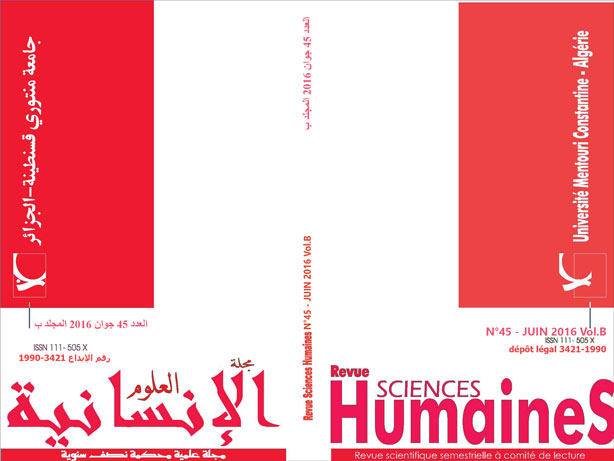Requests Politeness Strategies in Algerian Learners of English Academic Emails
Keywords:
Pragmatics, politeness, speech act, culture, request, email, linguistic proficiencyAbstract
How politeness is perceived in different languages and cultures is still a matter of controversy among linguists. There seems to be little agreement on what is polite/impolite in different languages and cultures. The situation is even more aggravated when it comes to foreign language learners. Because of their reliance on their native language/culture sociopragmatic and pragmalinguistic knowledge, many of them transfer their first language rules of politeness into the foreign language. This article is an attempt to examine the Algerian advanced learners of English notions of (in)directness strategies and politeness in the speech act of requests and to demonstrate that many of them fuse their native politeness conventions with those of English. This is mainly attempted through the analysis of their academic emails to their supervisors. The results showed that there is a correlation between complexity/simplicity of request strategies and the learners’ level of language proficiency and that the learners’ perception of politeness is influenced by their culture.
Downloads
References
Barron, Anne (2003). Acquisition in interlanguage pragmatics: Learning how to do things with words in a study abroad context. Amsterdam: John Benjamins.
Biesenbach-Lucas S (2007) Students writing emails to faculty: An examination of e-politeness among native and non-native speakers of English. Language Learning and Technology 11(2): 59-81
Blum-Kulka, S., &Olshtain, E. (1986). Too many words: Length of utterance and pragmatic failure. Journal of Pragmatics, 8, 47-61.
Blum-Kulka, Shoshana, Juliane House, and Gabriele Kasper. (eds.) 1989. Cross-cultural pragmatics: Requests and apologies. Norwood: Ablex Publishing
Brown, P. and Levinson, S. 1987. Politeness: Some Universals in Language Usage. Cambridge: Cambridge University Press.
Brown, P., & Levinson, S. (1987). Politeness: Some universals in language usage. England: Cambridge University Press.
Cohen, A.D. (1996). Developing the ability to perform speech acts. Studies in Second Language Acquisition,18, 253-267.
Crystal, D. (1993). An Encyclopaedic Dictionary of Language and Languages. Oxford: Blackwell.
Ellis, R. (1992). Learning to communicate in the classroom: A study of two language learners' requests. Studies in Second Language Acquisition, 14, 1-23.
Faerch, C. and Kasper, K. (1989). Internal and external modification in interlanguage request realisation. In S. Blum-Kulka, J. House and G. Kasper (Eds.), Cross-cultural Pragmatics, (pp. 1-34). Norwood, NJ: Ablex.
Faerch, C., & Kasper, G. (1989). Internal and external modification in interlanguage request realization. In S. Blum-Kulka, J. House, & G. Kasper (Eds.), Cross-cultural pragmatics (pp. 221-247). Norwood, NJ: Ablex.
Francis, C. (1997). Talk to me! The development of request strategies in non-native speakers of English. Working Papers in Educational Linguistics, 13(2), 23-40.
Goffman, E. ( 1959). The presentation of self in everyday life. New York: Doubleday.
Gumperz, J. J. (1982). Discourse strategies. Cambridge: Cambridge University Press.
Harlow, L. L. (1990). Do they mean what they say? Sociopragmatic competence and second language learners. The Modern Language Journal, 74, 328-349.
House, J., &Kasper, G. (1981). Politeness markers in English and German. In F. Coulmas (Ed.), Conversational routine (pp. 157-185). The Hague: Mouton de Gruyter.
House, J., & Kasper, G. (1987). Interlanguage pragmatics: Requesting in a foreign language. In W. Lorscher& R. Schulze (Eds.), Perspectives on language inperformance (pp. 1250-1288). West Germany: Narr, Tubingen.
House, Juliane (1989). Politeness in English and German: the functions of please and bitte. In Cross-cultural pragmatics: Requests and apologies, Shoshana Blum- Kulka, Juliane House, and Gabriele Kasper (eds.), 96119. Norwood, NJ: Ablex.
Hymes, D. H. 1971. Competence and performance in linguistic theory, in Huxley, R. and Ingram, E. (eds.), Language Acquisition: Models and Methods. London: Academic Press.
Kasper, G. (1990). Linguistic politeness: current research issues. Journal of Pragmatics, 14, 193-218
Kasper, G. (1992). Pragmatic transfer. Studies in Second Language Acquisition 8, 3,203~231.
Lazarescu, R. C. (2013). Can you upload as soon as you can please? A study of university student requests by e-mail in English medium instruction (Doctoral dissertation).
Leech, G. 1983. Principles of pragmatics. London: Longman.
Olshtain, E. and Cohen A. W. (1983). Apology: A speech-act set, in Wolfson, N. and Judd, E. (eds.), Sociolinguistics and language acquisition. (pp. 18-35). Cambridge, MA: Newbury House.
Otcu, B. &Zeyrek, D. (2006). Requesting in L2: Pragmatic development of Turkish learners of English. Proceedings of the 31st international LAUD symposium. Intercultural pragmatics, linguistics, social and cognitive approaches. Landau, Germany: Universität Duisburg-Essen.
Pan, P. C. 2012. Interlanguage requests in institutional e-mail discourse: A study in Hong Kong. Interlanguage request modification. Eds. M. Economidou- Kogetsidis and H. Woodfield. Amsterdam: John Benjamins. 119-162.
Parent, M. P. (2002). The production of requests by Catalan learners of English: situational and proficiency level effects. Atlantis, 2, 147-168.
Safont, M. P. (2008). The speech act of requesting. In E. Alcon (ed.). Learning how to request in an instructed languages learning context. Bern: Peter Lang, 41 –90.
Searle, J. R. (1975). Indirect speech act, in Cole, P. and Morgan , J. (ed.), Syntax and semantics: Speech acts.( pp. 59-82 ).New York: Academic Press.
Searle, J. R. (1969). Speech acts: An essay in the philosophy of language. Cambridge: Cambridge University Press.
Takahashi, T., & Beebe, L. M. (1993). Cross-linguistic influence in the speech act of correction. In G. Kasper & S. Blum-Kulka (Eds.), Interlanguage Pragmatic. New York: Oxford University Press.
Thomas, J. (1983). Cross-cultural pragmatic failure. Applied Linguistics, 4(2), 91-122.
Thomas, J. (1995). Meaning in Interaction: An Introduction to Pragmatics. New York: Longman.
Trosborg, A. (1994). Interlanguage pragmatics - Requests, complaints and apologies. Berlin: Walter de Gruyter& Co.
Weizman, Elda (1993) Interlanguage requestive hints. In Interlanguage Pragmatics, Gabriele Kasper and Shoshana Blum-Kulka (eds.), 123_137. Oxford UniversityPress.
Wierzbicka, A. (1991). Cross-cultural pragmatics: The semantics of human interaction. Berlin: Mouton de Gruyter.
Wierzbicka, A. (1985). Different culture, different languages, different speech acts. Journal of Pragmatics, 9, 145-78
Wolfson, N. (1989). Perspectives: Sociolinguistics and TESOL. New York: Newbury House Publishers
Yule, G. (1996). Pragmatics, in Widdowson, H.G. (ed.), Oxford introductions to language study. Oxford UniversityPress.

















